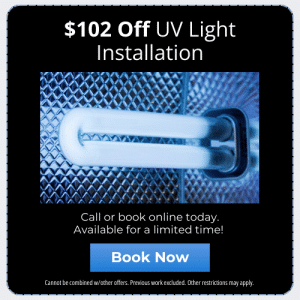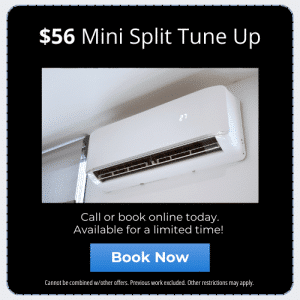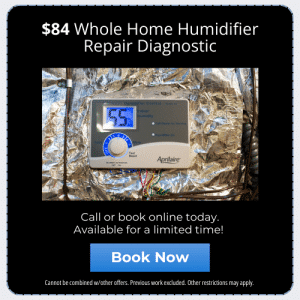Heating and air filters are an essential part of a residential HVAC system and are hands down the best, easiest, and least expensive way to preserve it. Great air filters not only extend the life of your heating and cooling units, but they also improve the air quality throughout your home.
Get Clean Air Filtration
If you’ve installed a new furnace, heat pump, or air-conditioning unit, remember to protect your investment with a good filter! Without a filter, the life of your equipment decreases as excessive debris quickly builds up on the parts and coils. Meanwhile, airborne dirt and allergens that could have been captured by a good quality air filter can affect the health of your family!
We supply and install all types of filters for residential heating and cooling equipment. And the dirty filters we remove? We bag those up and take them with us. It’s just one part of our overall superior customer service.
Why Are Air Filters Important?
Filters are designed to protect your heating and cooling units from dirt and debris that would otherwise build up and diminish the effectiveness of your units. Without filters, you’re looking at both higher utility bills and more dust and other allergens throughout your home.
Wonder how much dirt your filters can take out of the air over the life of your heating or cooling system? Researchers found as much as TEN POUNDS of dust hiding out in poorly maintained units!
The third/third Rule: Regular maintenance of your furnace, including filter changes, will allow your unit to last one-third (or approximately five years) longer, and cost about one-third less to operate in the meantime! We’re convinced, are you?
How Often Should I Change (or Wash) My Filters?
When figuring out when you should change (or wash) your filter, it’s best to go with the manufacturer’s recommendations (and take care of them more frequently if you have pets, excessive dust from a remodel project, or have left your home open during pollen season). While some disposable HVAC filters last up to a year others are designed to be changed every 30 days. It’s important to know your filter schedule.
Here are a few indications that your HVAC filter may need to be changed. You can see dust particles suspended in the air when sunlight shines through your window. You notice excessive dust buildup. Finally, if you have a flare-up of allergies. If you're having any of these issues, your home might also be a good candidate for a whole-house electronic air purifier.
Can a dirty filter do more harm than good? Yes! Clogged and dirty filters that are coated in dust and dirt cause many problems! They stifle your system, wear down the motor, cause the unit’s fan to work harder due to the lack of proper airflow, and make utility bills go up. Old filters are trash and that’s where they belong.
Tip! If a filter looks dirty, it probably is! You can always check just to be sure. But remember, details are important when installing or checking on a filter. Most HVAC filters have distinctly different sides, meaning they can only be placed facing a specific direction, usually with the webbing facing the unit. Don’t end up with a filter pad (or its already captured contents) floating around your system.
Types of Air Filters
There are many different types and sizes of filters, including washable and disposable. Information about your system’s filter requirements can be found in the owner’s manual, directions located on the unit, or online. You can also bring your old filter with you when buying a new one.
The other option is to use longer-lasting filters and leave the filter changes to us. It’s something we take care of during service calls and seasonal maintenance anyway!
Washable Filters
While many brands offer washable filters, these are not as effective at filtering smaller particles. Plus, they’re expensive on the front end (because they’re designed to last several years) and homeowners get tired of taking them out to clean several times a year. That’s why we recommend disposable filters that are regularly replaced.
One-Inch Disposable Filters
Your basic residential HVAC filter is approximately one inch thick and is made out of either fiberglass or paper with a metal backing to keep the filter contents from being sucked back into your HVAC system. They are primarily designed to protect your heating and cooling units, not to purify the air in your home, though they are helpful with that too. They come in numerous sizes and designs, including pleated, and are offered at varying price ranges and efficiencies. At the very least a one-inch disposable filter should keep dust, pet hair, dander, dead skin, lint, and other airborne particles away from your heating and cooling coils before they cause buildup, inefficiency, and damage.
Some one-inch disposable filters take care of additional contaminants, including allergens such as pollen, airborne mold, bacteria, and viruses. This provides better air quality throughout your home.
The only one-inch disposable filter that will eliminate odors is a carbon filter. You can read more about carbon filters here on our website.
Large Media Filter
A large media filter (or cartridge) is a pleated design measuring no less than four inches thick. They have different MERV ratings for particle size, dust holding capacity, and types of allergens they capture. The higher the MERV rating the more dirt the filter will catch and the closer the filter is in efficiency to a HEPA filter. But on the flip-side the more it will also restrict airflow. We can help you choose the best large media filter to match your system and air-quality goals.
Pleated filters last longer than standard one-inch disposable filters because the pleating provides a larger surface area for airborne mold, bacteria, allergens (such as dust and pollen), and viruses to collect. This means they don’t need to be changed as often, and some last up to one year. Your HVAC technician can let you know whether or not your heating and cooling units are compatible with a large media filter, as not every unit can accommodate them.
Carbon Filters
Carbon (or charcoal) filters are the only type of filters that will remove odors, contaminates, chemical pollutants, and volatile organic compounds (VOCs) that are released from carpeting, paint, nail polish, hair spray, fragrances, and cleaning agents in your home. Carbon filters are often a part of a whole-house electronic air filter, or they can be fitted in place of your regular one-inch disposable filters.
Pad Holding Frames
Pad Holding frames are an option if you want to change your filters regularly at a reduced cost, or if you want to use different types of filter media (the part that collects dirt) in your frames during different seasons of the year. Pad Holding Frames are inserted into your air-conditioning unit, furnace or air handler like any regular disposable filter but they can be reused over and over again with only the media (the material that actually collects the dirt and debris) needing to be changed. This media can be purchased in pre-cut pieces designed for your frame or on economy rolls that you trim to fit.
HEPA Filters
High-efficiency Particulate Arrestance (HEPA) filters take care of dirt particles, dust mites, pollen, and mold spores that are smaller than .3 microns (less than 1/200th of the width of a single human hair). We find that pretty impressive! In order to be rated as a HEPA filter it must meet standards set by the Department of Energy.
Most heating and cooling units do not have enough fan power to accommodate a HEPA filter, and this is something your TE Certified HVAC tech can determine for you. HEPA filters are commonly used in air purification systems that can be used in conjunction with your HVAC system. The one thing they cannot do on their own is eliminate all odors. You’ll need a carbon filter to additionally handle most pet smells, cigarette smoke, gas and cooking fumes, scents, and other chemical odors.
Electronic Air Filters
Electronic (or electrostatic) air filters have a 3-stage filtration system and are installed in your furnace or air-conditioning unit where they operate quietly and out of sight. They’re not disposable (but some have at least one disposable element). Unlike disposable filters, some of which need to be changed monthly, electronic air filters typically last four times longer than standard one-inch disposable air filters (or less if you have pets) before needing to be cleaned. This means you spend less time maintaining your home and more time enjoying it!
How do they work? Electronic Air Filters have an electronically charged negative field that captures even the smallest particles (ones that regular filters can’t). In a nutshell, the dirt or allergen goes into the filter, gets negatively charged, and then attaches to a positively charged plate or pad that is either disposable or washable. Many electronic air filters have a carbon component that helps eliminate odor in the air (this is non-washable but is replaceable). Some electronic air filters are also equipped with a UV (Ultra-Violet) light that breaks down the DNA of airborne bacteria, allergens, and viruses once they’re captured by the filter.
Since that’s a lot to remember, we just like to tell our customers that we think electronic air filters are great for establishing and maintaining excellent air quality, and we think every home should have one, including yours!
Air & Furnace Filters FAQs
How often should you replace your home HVAC air filter?
- Standard 1” filters should be replaced every 30–90 days, while media filters last 6–12 months. Homes with pets, smokers, frequent candle use, or allergy/asthma concerns may need more frequent changes. Low-use or vacant homes can go longer between replacements.
What type of air filter is best for allergies and pets?
- MERV (Minimum Efficiency Reporting Value) rates filters on a scale from 1 to 16—the higher the number, the better the filtration. Higher MERV filters trap more particles but may need to be changed more often. Basic filters are typically MERV 8 or below, while media filters offer higher ratings. Our AprilAire media cabinets come standard with MERV 13 filters, ideal for improving indoor air quality.
Are washable HVAC filters as effective as disposable ones?
- Washable HVAC filters (also called reusable or permanent filters) can be a convenient and eco-friendly option, but they aren’t always as effective as disposable ones—especially when it comes to allergen and fine particle filtration.
What is the difference between MERV, HEPA, and carbon filters?
- MERV is a rating system that measures a filter’s ability to trap particles. HEPA filters are ultra-fine filters that capture 99.97% of particles smaller than 0.3 microns—commonly used in hospitals and clean rooms. Carbon filters don’t focus on particles but instead remove odors, smoke, and VOCs (volatile organic compounds).














